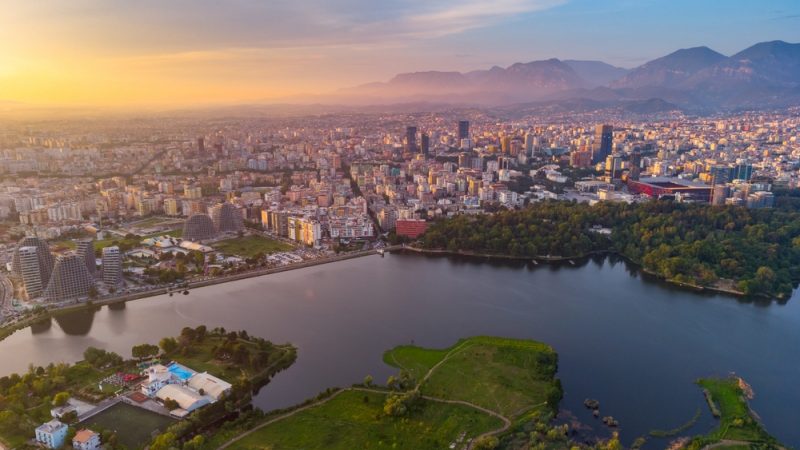Albania and the European Economic and Social Committee will set up a Joint Consultative Committee as Albania moves forward on its European Union integration path.
Albanian Prime Minister Edi Rama and EESC President Oliver Röpke confirmed the new approach in a joint press point on 19 September in Brussels, where the parties discussed imminent action needed for EU enlargement.
“It is encouraging for us to finalise the procedure of setting up the Joint Consultative Committee (JCC), which is proof of our belief that EU integration is not only a government issue but needs the contribution of society as a whole,” remarked Rama.
EESC President Röpke stressed that the European Economic and Social Committee already has the legal basis to establish the JCC with Albania.
“There is overwhelming support [in the Western Balkans] for the enlargement process. We cannot allow ourselves to disappoint these aspirations anymore. This is why we decided to implement one of the main priorities in my manifesto, the so-called Enlargement Candidate Members Initiative.”
This initiative is supported by the European Commission as well, through projects financing the attendance of Enlargement Candidate Members. It was personally granted by President von der Leyen, as Röpke explained during the press point.
In the next plenary session in October, the EESC will have a Candidate Enlargement Forum, where candidate members are invited to discuss the state of play of enlargement and expectations.
Ministers from various EU candidate countries, but also Member States, have been invited to join the discussions. Commissioners Olivér Várhelyi and Nicolas Schmit will also be part of the session.
From pilot project to permanent mechanism
In February 2024, the EESC became the first EU institution to accept members from candidate countries, including Albania, Bosnia and Herzegovina, Georgia, Montenegro, North Macedonia, Moldova, Serbia, Türkiye and Ukraine.
The JCC is a platform established by the EESC in partnership with the civil society of EU candidate countries. In the Western Balkans, only Serbia has so far established a JCC. The same mechanism has also been established in Türkiye.
While this is a pilot project due to end in 2024, President Röpke announced his committee’s clear intentions to prolong the duration and have it as a permanent structure within the institution.
“We should not be small on such a big political question. Enlargement with the Western Balkans is for us a strategic priority, and we will find the means to finance this and have it as a permanent mechanism.”
Keeping spirits high for enlargement
Analysing the enlargement process, Röpke highlighted that “while the pace of EU integration may be slow, we must ensure the process remains transparent, results-oriented, credible, and we have to keep the momentum.”
“Our approach to integrating candidate countries and civil society as soon as possible in a gradual manner is enshrined. There is a clear commitment, and we call on other institutions to follow this example.”
For Rama, the most important element in the process is the deep transformation the country is going through, calling it an “extraordinary, democratic-state-building process.”
“Whoever is blessed to be in the middle of the EU has this tool provided by the integration process. When we talk about functioning democracy as the defined near future of the Western Balkans, we talk about something very realistic, not like functioning democracy in Afghanistan. We have the EU, they don’t.”
Team of experts in the European Parliament
Rama announced the Albanian government will present a written request to Commission President Ursula von der Leyen with demands to get further access to the EU and its mechanisms.
“We are looking forward to getting more into the body of the European Union, not for the money, but for the know-how, to understand how the future will look like when we become full members, for the need to strengthen these ties through real work.”
He also mentioned that the government is advocating to have a team of experts in the European Parliament as well.
“We should be present in the European Parliament with teams that will start to prepare for the next phase. We should not start from scratch, like a Japanese tourist visiting the Louvre. We should already be inside with the statues,” the Albanian PM remarked.
Getting youth involved
Both President Röpke and PM Rama emphasised on the importance of getting youth involved in the EU integration process and politics. The Albanian PM encouraged youth “not to wait for older people’s plans to do what they need to do”.
EESC’s flagship initiative, the EU Youth Test, involves youth representatives from outside the committee, with the involvement of candidate countries as well.
“Next year, we plan together with Eurofound and the European Training Foundation an event in Albania, focused on strengthening social dialogue but also the involvement of youth and the Youth Test,” Röpke added.
[Edited By Brian Maguire | Euractiv’s Advocacy Lab ]
Read more with Euractiv
Zelenskyy tells UN Russia must be forced into peaceUkrainian President Volodymyr Zelenskyy told the United Nations Security Council on Tuesday (24 September) that the war between Russia and Ukraine cannot be calmed by talks alone, but that Moscow must be forced into peace.
Source link : http://www.bing.com/news/apiclick.aspx?ref=FexRss&aid=&tid=66f4d21f005742d7a0f21d6ed847d66e&url=https%3A%2F%2Fwww.euractiv.com%2Fsection%2Fenlargement-neighbourhood%2Fnews%2Feesc-albania-establish-joint-consultative-committee-including-civil-society-in-eu-integration-process%2F&c=1429126449928826701&mkt=de-de
Author :
Publish date : 2024-09-25 20:04:00
Copyright for syndicated content belongs to the linked Source.
